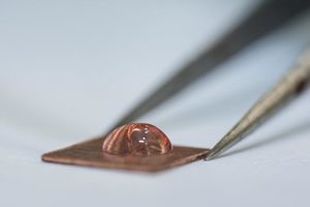
This is human coronavirus 229E being inactivated on copper.
New research from the University of Southampton has found that copper can effectively help to prevent the spread of respiratory viruses, which are linked to severe acute respiratory syndrome (SARS) and Middle East respiratory syndrome (MERS).
Animal coronaviruses that 'host jump' to humans, such as SARS and MERS, result in severe infections with high mortality. The Southampton researchers found that a closely-related human coronavirus -- 229E -- can remain infectious on common surface materials for several days, but is rapidly destroyed on copper.
A newly-published paper in mBio -- a journal of the American Society for Microbiology -- reports that human coronavirus 229E, which produces a range of respiratory symptoms from the common cold to more lethal outcomes such as pneumonia, can survive on surface materials including ceramic tiles, glass, rubber and stainless steel for at least five days. While human-to-human transmission is important, infections can be contracted by touching surfaces contaminated by respiratory droplets from infected individuals, or hand touching, leading to a wider and more rapid spread
On copper, and a range of copper alloys -- collectively termed 'antimicrobial copper' -- the coronavirus was rapidly inactivated (within a few minutes, for simulated fingertip contamination). Exposure to copper destroyed the virus completely and irreversibly, leading the researchers to conclude that antimicrobial copper surfaces could be employed in communal areas and at any mass gatherings to help reduce the spread of respiratory viruses and protect public health.
Lead researcher Dr Sarah Warnes said: "Transmission of infectious diseases via contaminated surfaces is far more important than was originally thought, and this includes viruses that cause respiratory infections. This is especially important when the infectious dose is low and just a few virus particles can initiate an infection.
"Human coronavirus, which also has ancestral links with bat-like viruses responsible for SARS and MERS, was found to be permanently and rapidly deactivated upon contact with copper. What's more, the viral genome and structure of the viral particles were destroyed, so nothing remained that could pass on an infection. With the lack of antiviral treatments, copper offers a measure that can help reduce the risk of these infections spreading."
Read the rest of this article at : source.
 RSS Feed
RSS Feed